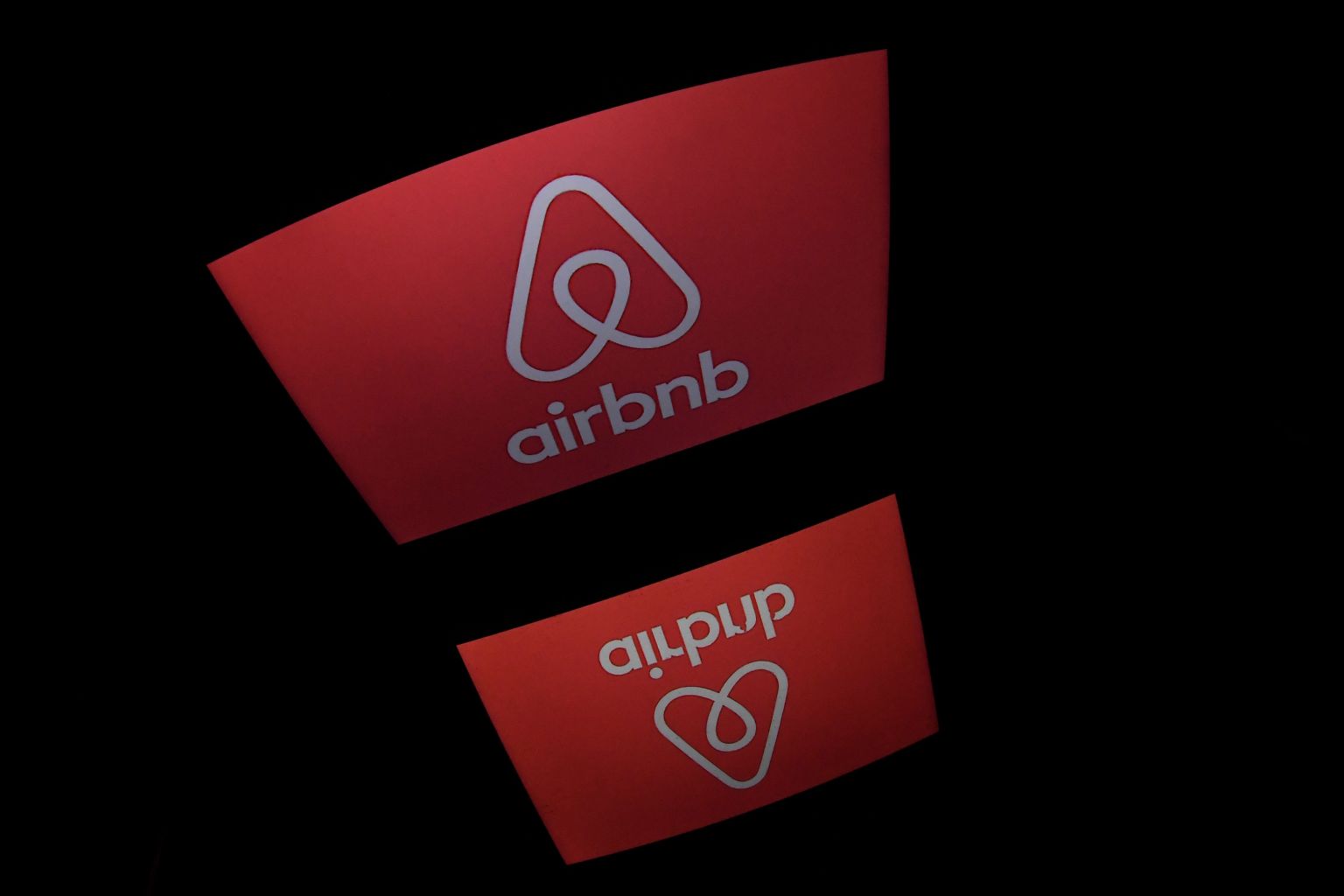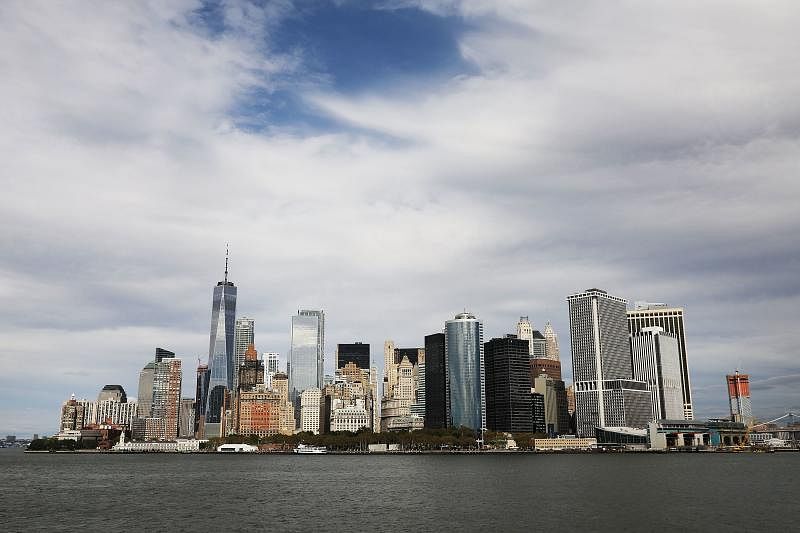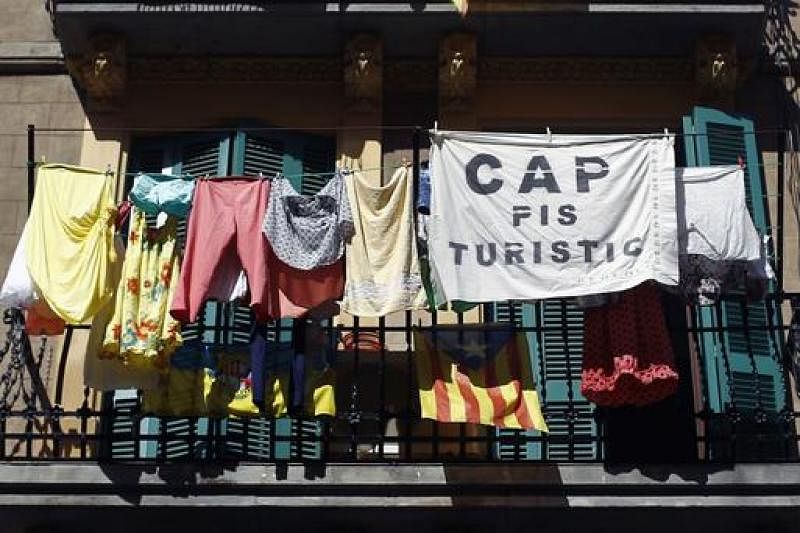Two Singapore hosts fined for illegal home sharing: Airbnb laws in various cities
Sign up now: Get ST's newsletters delivered to your inbox

Airbnb is legislated differently in various cities and countries.
PHOTO: AFP
Lydia Lam
Follow topic:
This story was first published on Dec 6, 2017, and last updated on April 16, 2018
SINGAPORE - Two Airbnb hosts were fined $60,000 each on April 3 over their roles in providing unauthorised short-term stays - the first case of prosecution for a breach of the Urban Redevelopment Authority rules on such rentals.
Former property agents Terence Tan En Wei, 35, and Yao Songliang, 34, had pleaded guilty to four charges earlier in February. The pair had earned at least $19,000 over a five-week period.
Airbnb is popular around the world, but is legislated differently in various cities and countries.
Here is a closer look at the laws in some places.
1. Singapore
On June 30 last year, the Urban Redevelopment Authority (URA) cut the minimum duration for staying in a private residential property from six months to three months.
The change took immediate effect and applied to all private homes approved for residential use.
Before this, the minimum stay duration was six months for private homes, and this had been in place since 2009.
URA's move factored in a growing demand from groups seeking accommodation for periods of between three to six months, such as academics and students visiting local Institutions of higher learning, and professionals on work assignments.
It is also reviewing possible guidelines to facilitate short-term rentals and intends to conduct a public consultation to seek feedback on this.
According to the Housing Board's website, subletting out a HDB flat or a room in a flat is allowed but is subject to strict conditions.
Also, the minimum subletting period for both cases is six months.
This renders it incompatible with Airbnb's model, which lets travellers stay at a home for as little as two or three days, depending on the host's preference.
2. London
In December last year, Airbnb announced that hosts in London will need a licence to rent their homes for more than 90 days per calendar year.
The measures kicked in on Jan 1 this year, with Airbnb's systems automatically limiting entire home listings in greater London to 90 nights a year.
This is unless hosts confirm that they have the required permission via an exemption form to share their space more frequently.
The move came after a study found that 23 per cent of Airbnb rental homes in the British capital were booked for more than 90 nights per year.
This amounted to 4,938 of its "entire home" London listings, said the Airbnb-commissioned study by British think-tank, the Institute for Public Policy Research (IPPR).
"The problem was that a website that was about people making a little money letting out rooms was being abused by professional landlords turning their properties into hotels by the back door," Mr Tom Copley, Labour's housing spokesman on the London assembly, told The Guardian.
3. Paris

In July last year, the Paris City Council ruled that people renting out their apartments on short-term rental sites like Airbnb must register their property with the town hall from December.
The move was welcomed by French hoteliers, even as Airbnb and other rental platforms were criticised for driving up property prices and contributing to a housing shortage.
With 350,000 listings in July, France was Airbnb's second-largest market after the United States.
The ruling requires property owners to obtain a registration number from the town hall before being able to post advertisements for short-term rentals on websites.
This made it harder for those renting out property to exceed the legal rental limit for a main residence of 120 days a year.
It also made it easier for authorities to track which properties are rented out and to collect local taxes.
Additionally, Airbnb said in November that a 120-night-per-year limit will be imposed on hosts in four central Paris neighbourhoods renting out their entire homes.
4. Vancouver
The Canadian city passed new rules in November last year banning homeowners from renting out certain kinds of property on short-term rental websites like Airbnb.
The city did so in a bid to deal with a housing shortage that led to increasing rents.
Under the new laws, home owners cannot list homes that are unoccupied in the long term on such rental websites.
Entire condos and secondary suites - self-contained dwellings within a house or on the same grounds as the main property - are also not allowed to be listed on short-term rental websites.
The city defines a short-term rental as one under 30 days.
Home owners are, however, allowed to rent out part or all of their principle homes for less than 30 days at a time after getting a C$49 ($51) annual licence and paying a $54 one-time activation fee.
5. New York

In October 2016, New York tightened rules on short-term rentals.
A New York state law on the books since 2010 already prohibited renting an entire apartment for fewer than 30 days if the owner or lessor is not present.
The new law forbids advertising for this kind of short-term rental and imposes a fine up to US$7,500 (S$10,000).
The move was challenged by Airbnb, which said the law could expose it to significant penalties for advertising short-term apartment rentals.
Airbnb had contended that the law's ambiguous wording could allow New York authorities to apply it to online platforms like it that host third-party listings, creating the risk of significant civil penalties and criminal liability.
Under the terms of settlement, New York City agreed that the law would not be enforced against the company and was instead aimed at individual violators, a spokesman for Mayor Bill de Blasio said.
The deal followed an earlier settlement with the New York state attorney-general, who agreed his office would refrain from taking any action to enforce the law, citing an express provision stating enforcement would be carried out by the city.
6. Amsterdam

In December 2016, Amsterdam, capital city of The Netherlands, reached an agreement with Airbnb to limit the sharing of private homes in the city to 60 days a year.
The city of some 830,000 residents, famous for its canals, welcomes more than 17 million visitors every year, leaving many jostling for space on its busy roads and pushing up the price of accommodation.
Under the agreement, which went into effect in January last year and continues until the end of 2018, Airbnb vowed to introduce a new day counter on its site to help hosts track their rentals and to ensure no one breaks the rules.
7. Berlin
In July 2016, a Berlin court upheld a city regulation that renders short-term home rentals in the German capital illegal, in a ruling with ramifications for firms like Airbnb.
Several home-sharing companies had lodged a complaint against an effective ban on short- term rentals in Berlin in the first substantial challenge to such city legislation in Europe.
"The availability of affordable housing is severely threatened in the entire city of Berlin and the regulation is therefore justified," said judge Rautgundes Schneidereit, who rejected an argument that the regulation violated home owners' basic rights.
The Berlin authorities said they estimated that a total of 15,000 apartments were taken off the city's rental market for tourists as a result of the regulation.
People renting out their homes in the German capital for periods of less than two months face fines of up to €100,000 (S$153,000).
Although landlords can seek a permit, city officials have said they will reject 95 per cent of requests.
8. Iceland
In May 2016, Iceland announced new legislation that restricts the number of days residents can offer Airbnb rentals in their properties to 90 days a year.
Those who exceed that figure must pay a business tax, and the law came into effect on Jan 1 last year.
Individuals must also register with the District Commissioner and pay a registration free of 8,00O ISK (S$104), according to Iceland's Ministry of Industries and Innovation's website.
They must provide the District Commissioner an overview of the number of days rented and rental income, and must also display their registration number at their property.
The move was but one of a series of measures to control a sharp rise in visitors to the North Atlantic island's 335,000-strong population.
In April 2016, the country's supreme court ruled that anyone in an apartment block who wanted to rent out their apartment through Airbnb needed permission from other residents.
9. Barcelona

In November 2016, Spanish capital city Barcelona fined home-sharing websites Airbnb and Homeaway €600,000 (S$633,600) each for advertising and renting out apartments to tourists without a licence, the Catalan regional government said.
The Barcelona council reported that Airbnb and Homeaway were repeat offenders having illegally advertised 3,812 and 1,744 properties respectively. An additional nine rental sites are expected to also face fines up to €30,000 for failing to follow regional tourism laws.
Barcelona's mayor Ada Colau had in 2015 threatened to fine firms like Airbnb and Booking.com if they marketed apartments to tourists without a number showing that they were on the Catalan tourism register.
Locals were upset at the sharp increase in people letting out rooms or apartments using websites such as Airbnb.
"The tourist flats are making the area much more expensive. Flats that could perfectly well be rented for €300 euros or €400 (a month) are being rented for €600 or €700," said Oriol Casabella, spokesman for a La Barceloneta neighbourhood group. "If this doesn't stop, a time will come when they will throw us out because there are many people who can't afford these flats," he told Reuters in a 2015 report.
The Guardian said in a report in June last year that the number of inspectors who roam the city's streets seeking out illegal rentals, armed with apps that reveal at a click whether properties are legal or not, had doubled from 20 to 40.
This number will grow to more than 100 by 2018, it said.
The city has stopped issuing holiday rental licences and many existing licences in the most heavily touristed areas such as Ciutat Vella (the old city) will not be renewed when they expire. After a hotline for reporting illegal flats opened, the number of calls from the public rose from 39 in 2015 to 2,784 a year later.
10. Japan
In March last year, the National Diet of Japan enacted legislation that gave the green light for home sharing and short-term rentals in Japan, Airbnb's most popular market in Asia Pacific.
The move provided clarity and certainty for thousands of locals who were already hosts on Airbnb.
In 2016, Airbnb's host community boosted the Japanese economy by 920 billion yen (S$11 billion), an Airbnb spokesman told The Straits Times. In the last 12 months, five million international and domestic travellers used Airbnb in Japan, with guests visiting all 47 prefectures.
Through dialogue and collaboration with Airbnb, Japan has developed a framework that allows for home sharing within the parameters that work for them. The framework also helps solve challenges that are specific to Japan, such as unoccupied homes, Airbnb said.
Under the new regulation, all property owners in Japan can lease their homes to guests for a maximum of 180 days a year, after they declare their intent to the prefectural government.
Owners must also adhere to strict hygiene control standards, maintain a list of guests, and put up bulletins notifying neighbours that their homes are being used for short-term rentals. They must also respond promptly to any complaints from neighbours.
SOURCES: AFP, BBC, CNN, HDB.gov.sg, Reuters, The Business Times, The Guardian, Vancouver Sun

